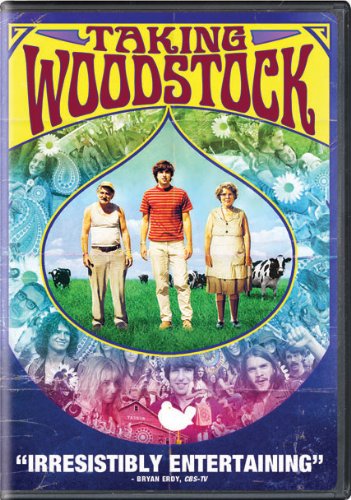
For the last 40 years, the original Woodstock Music & Art Fair has been a beloved symbol of the ‘60s—of peace, love, and music. But Taking Woodstock shows a different side of the Great Festival—and it all starts with a rundown motel in the Catskills.
Based on the book by Elliot Tiber, Taking Woodstock goes behind the scenes to explore how a struggling artist saved the festival from certain doom. After putting his dream of becoming a successful artist/designer on hold, Elliot (Demetri Martin) leaves New York City and returns home to the small town of Bethel to help his parents run the nearly-bankrupt El Monaco Motel.
Elliot’s summer plans once again include his annual music festival—which, if all goes well, might actually get a live band to perform this year. But when Elliot hears about the Woodstock Festival—which just lost its permits in nearby Wallkill—his plans change. A real festival (with real musicians) could be just what his family needs to give the El Monaco a much-needed boost. But it isn’t until people begin flocking to Bethel that Elliot starts to realize the magnitude of his little business venture.
Taking Woodstock isn’t like other Woodstock-based movies. It isn’t a psychedelic adventure, focused on hippies or free love or music. It isn’t about the turbulence of the ‘60s, either. Instead, it’s about Elliot and the other people of Bethel—and how their little world was shaken by an event that took place in their backyard. That unique perspective makes it an intriguing film—even if you’ve seen your share of Woodstock documentaries—because it injects a touch of character and personality into the story.
Still, it wasn’t long ago that director Ang Lee was seen as a ground-breaking director who pushed the envelope and stunned audiences with movies like Crouching Tiger, Hidden Dragon and Brokeback Mountain. Lately, however, the results of his envelope-pushing have been less than stunning. His controversial 2007 release, Lust, Caution (which received a box-office killing—and completely unnecessary—NC-17 rating), offered beauty without passion. And, in the same way, Lee’s Taking Woodstock turns an interesting idea into a largely forgettable film.
Despite the story’s factual foundation, Elliot often feels like the same old character in the same old coming-of-age movie. He longs for the freedom to follow his dreams—to move to California and be an artist—and he feels tied down by his parents’ demands and expectations. Of course, throughout the Woodstock experience, then, he slowly learns to stand up for himself. Meanwhile, this historic event plays out in the background—a fascinating but somewhat distant backdrop to a mildly interesting (and somewhat cliché) story.
Though the event itself (or at least its planning) was anything but relaxed and low-key, Taking Woodstock moves along at a relaxed pace. It takes a while for the story to pick up pace—and, even after it does, it still meanders from one thing to another, with characters coming and going without much fanfare. Fortunately, though, those characters are sometimes wonderfully entertaining—from Elliot’s hysterical mother (played by Imelda Staunton) to Liev Schreiber’s eccentric security guard—and they’ll keep viewers from losing interest.
Taking Woodstock offers a fresh perspective on Woodstock, but the story (and its main character) sometimes feels a bit stale. So while the historical details do make it an interesting film, unlike the actual Woodstock festival, there’s nothing especially ground-breaking or memorable about it.


